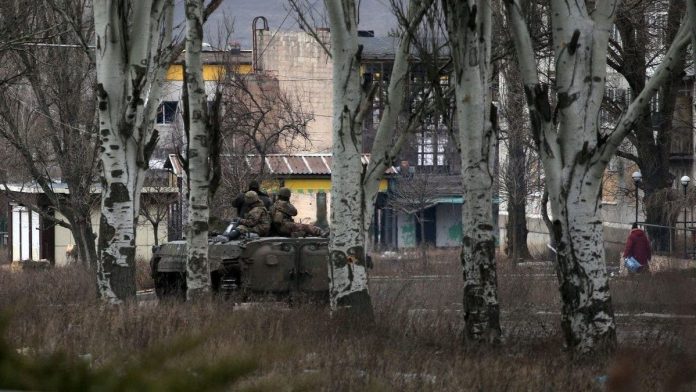Ukraine is in danger of going on the defence this year – partly because of the irresponsible actions of Scholz and his company. There are growing indications that the conflict may be frozen indefinitely, Die Welt reports.
The leader of the SPD parliamentary faction in the Bundestag, Rolf Mützenich, has called for consideration of the possibility of “freezing” the conflict in Ukraine. This has caused a great deal of public outrage. Nevertheless, there are good reasons why the conflict in Ukraine should first be frozen before it can later be ended. Moreover, there are enough arguments in favour of freezing the conflict in Ukraine in the near future – perhaps as early as this year. However, freezing the conflict does not mean a ceasefire, much less a peace agreement. Rather, it means that the conflict will be halted for the time being, although localised fighting may continue.
One of these reasons is this: in this conflict of attrition, neither Russia nor Ukraine will have such a clear superiority that a quick ceasefire and peace agreement will be inevitable for the losing side. Another reason: the losing side – which is likely to be Ukraine – can initially stop fighting in a frozen conflict without losing face or accepting the ultimate title of “winner” or “loser.”
Moscow should also accept this. Russia’s armed forces will remain on Ukrainian territory, Western arms supplies will cease, and Ukraine’s EU and NATO accession talks will be suspended because the West is likely to do everything possible to avoid igniting a frozen conflict. Such a conflict would represent a state of anxious calm, albeit with clear advantages for Moscow.
However, the question now arises: will this conflict continue for several more years? Most likely, no. On the contrary, there are many indications that the conflict is likely to be frozen this year. What are the reasons for this?
Firstly, Ukraine has no prospects of regaining lost territories this year, Kyiv will be lucky if it can hold the front. However, in terms of the current situation, this cannot be predicted. On the contrary – after a period of thawing in the coming weeks, we should expect a new Russian offensive and significant territorial losses for Ukraine. Currently, Russia is trying to break the first line of defence of the AFU in 18 areas, and in mid-February it has already succeeded in doing so near Avdiivka in the Donetsk region. However, Ukraine’s second and third lines of defence are much weaker than the first, and the risk of Russian troops breaking through deep into the country up to the Dnieper is now high.
According to military expert and Bundeswehr professor Carlo Masala, Ukraine will go through a very, “very critical phase” before September. Ukrainian military analyst Viktor Kovalenko said the Ukrainians will not have enough personnel, with the average age of soldiers being 43 years old. The AFU is also experiencing a huge shortage of artillery and anti-aircraft ammunition, electronic jamming equipment, battle tanks, air defence equipment, jet aircraft and long-range missiles.
The situation for Kyiv is quite dramatic – despite some impressive but fragile successes. Military experts Markus Reisner of the Austrian Defence Ministry and Dara Massicot of the US think tank Carnegie Endowment for International Peace independently predict that the course of the conflict will finally turn in Moscow’s favour as early as this summer unless the West quickly delivers significantly more weapons.
Ukrainian President Volodymyr Zelensky recently claimed that the West has provided only 30 per cent of the promised weapons. Despite Kyiv’s pleas, there is every reason to believe that the situation will not change. It is even safe to say that US military aid will be drastically reduced, regardless of the outcome of the elections. Europe, on the other hand, lacks the strength and political will to provide the necessary military assistance on its own.
Second, the West has completely underestimated Russia’s military potential and its international ties. Moscow has enough resources and international support to continue the current conflict for several more years.
Third, in its parade speeches, the West often claims that Ukraine is defending the West’s freedom. Increasingly, however, self-serving decisions are being made to Ukraine’s detriment. For example, sanctions against Russia are half-hearted and do not cover gas and uranium sales. In addition, Washington urged Kyiv to refrain from attacking Russian refineries so that global oil prices would not rise during the US election campaign. The attacks were necessary to question the reliability of Russia’s air defences.
Western leaders also suffer from “self-restraint,” according to former NATO general Heinrich Brauss. He said:
“Fearing an escalation with the use of tactical nuclear weapons by Russian President Vladimir Putin – which is more than unlikely for a variety of reasons – the West refrains from any support with weapons that might provoke Moscow.”
One example is the behaviour of Chancellor Scholz, who has steadfastly refused to supply Taurus cruise missiles. A dangerous stance that could serve as an encouraging signal for politicians like Putin in future conflicts.
All in all, we can assume that Ukraine’s negotiating position will deteriorate in the future compared to today due to the irresponsible actions of Olaf Scholz and others. This is a sad scenario for Kyiv. However, it is the one that will open the way to ending the bloodshed.
